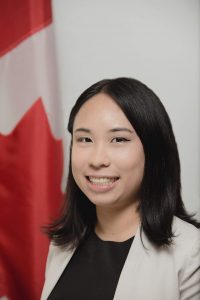Interested in what you can do with a degree in Asian Studies? In our Alumni Spotlight Interview Series, we ask our alumni about their career paths, how they became interested in Asian Studies and for any advice they would give to current students. This interview features Verna Yam (BA 2018) who enhanced her degree in International Relations with an Asian Area Studies minor. Verna is currently working in Ottawa as a Trade Policy Analyst at Global Affairs Canada.


Tell us a little about yourself, your background and how you became interested in Asian languages and cultures?
Having been connected to my Chinese heritage through my family and childhood, I have appreciated Chinese culture since an early age. However, I never thought about pursuing Asia academically or professionally until I finished my first year at UBC – I actually wanted to learn French and go to France for exchange! I realized that my interests were elsewhere when I saw that all the papers I wrote for a first year world history course were about China. This signalled to me that I ought to explore China and Asia more, leading me to register for Asian studies courses and Chinese language courses. The rest is history!
Could you elaborate on an experience that you felt was fundamental in your acquisition of the language or appreciation of the culture?
Participating in UBC tandem Language Learning Program reinforced my Mandarin speaking skills. I was taking UBC Chinese language courses at the time, but tandem provided valuable support as it offered the chance to practice oral Mandarin on a one-on-one basis. My tandem partner also shared personal experiences that gave me a better understanding of Chinese society. Language acquisition aside, it was just generally wonderful to chat with and learn about a fellow UBC student who I would otherwise likely have never encountered.
What choices did you make at UBC that contributed to your career success / journey?
I owe a lot of the essential skills that I use in my job to my experiences in the UBC Arts Co-op Program and the extracurricular roles that I held at during my time at UBC. These experiences helped me develop the teamwork, communication and organization skills that are essential to my job today. Additionally, the various government positions through co-op work terms allowed me understand what work there was in government and international affairs, as well as what I liked or didn’t like.
While those non-academic experiences come to mind first when I think of my career success, I owe a lot to the decisions I made during courses as well. I took advantage of opportunities during my courses, such as term papers, to research areas of interest. I have emerged from those exhausting term papers with a wealth of knowledge that provides useful context for my work, or sets me apart from colleagues who have different areas of expertise.
Is your current career path as you originally intended? What challenges did you face in launching your career?
I’m lucky that as I pursue my interest in international relations, I continually receive affirmation that this is the general field that I want to be in. My areas of interest have drastically evolved though. I changed my geographic focus to Asia and I developed an interest in climate change. When I notice that I am leaning towards certain areas, I take note and try to use upcoming opportunities (e.g. writing a term paper) to immerse myself in the topic and confirm my interest.
The opportunities that didn’t seem like a good fit for my interests were challenges along my career path, but they also turned out to be opportunities to develop my career. For instance, throughout my time at UBC, I never got the co-op jobs that I wanted in Global Affairs Canada. However, the positions that I got at Environment and Climate Change Canada sparked my interest in climate change.
Even now, my current trade policy job is a far cry from the international climate change cooperation that I hope to eventually to work on. I also don’t work on China, which is what I focussed on throughout school. Still, working on a dimension of Canada’s foreign policy with Asia is a fantastic start to my career. I am confident that I am developing relevant skills for future positions and I constantly seek opportunities to enhance my understanding of my interest areas. With the support of my team, I am also able to bring some of my interests to my job.


What makes you proud about your current job? How does it relate to your degree?
My work is a very, very small part of Canada’s foreign policy towards Asia, but I am proud to be helping advance Canadian interests. I am glad that I am working on Asia, the area that my degree and studies focussed on. It is very exciting to be able to use my background on Asia to contribute towards Canada’s foreign relations with Asian countries.
Has learning an Asian language helped you achieve your personal or professional goals? What tips do you have for students who are keen to play the ‘language card’ in their career development?
I do not use Asian languages at work but learning them has given me deeper insight into cultures and societies that are relevant to my work. Such insight is helpful for navigating news and interactions with these countries.
Learning Asian languages has also allowed me to connect with speakers of those languages. This has been extraordinarily gratifying on a personal level, as I interact with people whose preferred language is not English and hear their stories and thoughts more fully when they speak in their language of choice. I have used Mandarin, which I took at UBC, to build relationships with youth that I met at international conferences.
What advice would you give to students and alumni interested in breaking into your industry?
If you are looking to work on Canadian foreign policy, consider looking for positions in Ottawa. Provincial governments may have international relations-related policy jobs, but there may be more jobs available within federal government since the federal government has jurisdiction over Canada’s foreign affairs.
Also, I recommend looking at departments other than Global Affairs Canada for jobs in international affairs. While Global Affairs Canada is the main department in charge of Canada’s foreign affairs, each department has work with an international dimension, and thus have positions related to international affairs too. Even if you aim to work for Global Affairs Canada eventually, experience in other departments can be valuable as it provides insight into how other departments operate and contribute to Canada’s foreign policy.


